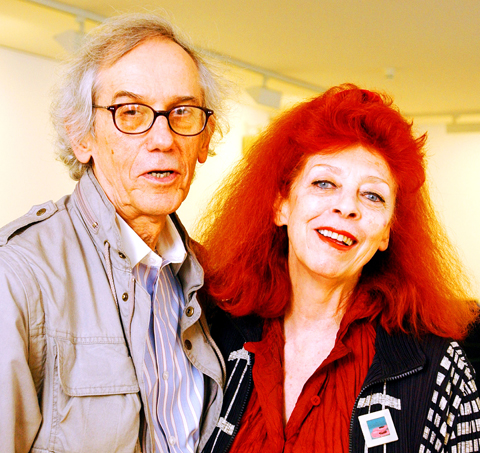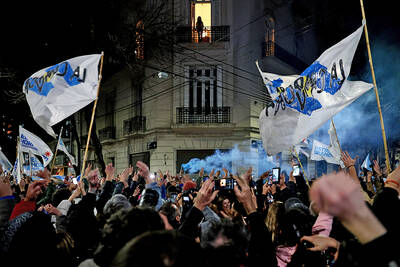The flame-haired artist Jeanne-Claude — or Mrs Christo, as she sometimes called herself — worked with her husband to mummify the Pont Neuf, to envelop a string of Miami islands in flamingo-pink nylon, to bind the German Reichstag building in aluminum fabric and to erect 7,503 billowing, saffron “gates” in Central Park, New York. She has died aged 74, from complications of a brain aneurism suffered after a fall.
Jeanne-Claude Denat de Guillebon was born in Casablanca, Morocco, where her father, a French general, was stationed at the time. She was born on exactly the same day as her husband and collaborator, Christo Javacheff.
“Both of us at the same hour,” Jeanne-Claude liked to say, “but, thank God, two different mothers.”

PHOTO: EPA
She often acted as spokesperson for the pair, explaining that as “twins,” they had an almost symbiotic relationship and spoke in one voice (usually hers).
“Sometimes we would both have the same idea at the same time,” she said. “You know how people who live with a dog start looking like their dogs?”
She was much more than simply his muse or manager. Until 1994, all their artworks bore only Christo’s name, apparently because they thought it would be easier for one artist to become established, but since then the pair have shared the credit. It was entirely her idea, Christo said after the fact, to create Surrounded Islands (1980-1983), which used 550,000m² of pink fabric to outline an archipelago in Miami as if with a highlighter pen (“a giant Pepto-Bismol spill,” one critic said).
Christo retroactively corrected the record and now they are acknowledged as joint authors of every outdoor installation they plotted from 1961 onwards. That year Christo proposed the wrapping of their first building, the Ecole Militaire in Paris.
She met Christo in 1958, soon after he moved to Paris from his native Bulgaria, where his father owned a textile factory. Influenced by Man Ray, who in 1920 wrapped a sewing-machine in a blanket, bound it with string and photographed it to illustrate the surrealist’s famous definition of beauty — “the chance encounter of a sewing-machine and an umbrella on a dissecting table” — Christo had begun to parcel objects. In his humble attic studio, he wrapped cans, bottles, shoes, chairs — which he considered his “real” art and autographed with his first name — while paying his way by washing dishes and painting conventional portraits, which he signed with his surname.
Jeanne-Claude’s mother was impressed with a Javacheff portrait she spied at her hairdresser’s, and invited the struggling migrant to the family chateau to paint one of her. Their debutante daughter remembers seeing the artist at work and remarking: “Mother’s brought home another stray.”
She assumed Christo was gay.
“He is so skinny,” she said to her mother, “and he’s got long thin hands — and he paints.”

LANDMARK CASE: ‘Every night we were dragged to US soldiers and sexually abused. Every week we were forced to undergo venereal disease tests,’ a victim said More than 100 South Korean women who were forced to work as prostitutes for US soldiers stationed in the country have filed a landmark lawsuit accusing Washington of abuse, their lawyers said yesterday. Historians and activists say tens of thousands of South Korean women worked for state-sanctioned brothels from the 1950s to 1980s, serving US troops stationed in country to protect the South from North Korea. In 2022, South Korea’s top court ruled that the government had illegally “established, managed and operated” such brothels for the US military, ordering it to pay about 120 plaintiffs compensation. Last week, 117 victims

China on Monday announced its first ever sanctions against an individual Japanese lawmaker, targeting China-born Hei Seki for “spreading fallacies” on issues such as Taiwan, Hong Kong and disputed islands, prompting a protest from Tokyo. Beijing has an ongoing spat with Tokyo over islands in the East China Sea claimed by both countries, and considers foreign criticism on sensitive political topics to be acts of interference. Seki, a naturalised Japanese citizen, “spread false information, colluded with Japanese anti-China forces, and wantonly attacked and smeared China”, foreign ministry spokesman Lin Jian told reporters on Monday. “For his own selfish interests, (Seki)

Argentine President Javier Milei on Sunday vowed to “accelerate” his libertarian reforms after a crushing defeat in Buenos Aires provincial elections. The 54-year-old economist has slashed public spending, dismissed tens of thousands of public employees and led a major deregulation drive since taking office in December 2023. He acknowledged his party’s “clear defeat” by the center-left Peronist movement in the elections to the legislature of Buenos Aires province, the country’s economic powerhouse. A deflated-sounding Milei admitted to unspecified “mistakes” which he vowed to “correct,” but said he would not be swayed “one millimeter” from his reform agenda. “We will deepen and accelerate it,” he

Japan yesterday heralded the coming-of-age of Japanese Prince Hisahito with an elaborate ceremony at the Imperial Palace, where a succession crisis is brewing. The nephew of Japanese Emperor Naruhito, Hisahito received a black silk-and-lacquer crown at the ceremony, which marks the beginning of his royal adult life. “Thank you very much for bestowing the crown today at the coming-of-age ceremony,” Hisahito said. “I will fulfill my duties, being aware of my responsibilities as an adult member of the imperial family.” Although the emperor has a daughter — Princess Aiko — the 23-year-old has been sidelined by the royal family’s male-only